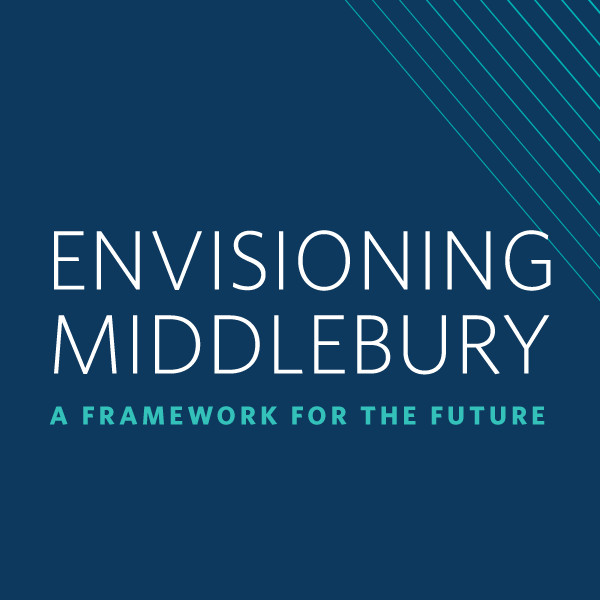Board Notes: Trustees Ratify New Strategic Framework for Middlebury

MIDDLEBURY, Vt. – With sustained applause and a standing ovation, Middlebury’s Board of Trustees has given its enthusiastic support to a strategic framework for the future, at once nimble and wide-ranging, that will guide the institution for years to come.
The board resolution, passed on Oct. 21, praised “the deep and sustained work” of the last 18 months that gave voice to the hundreds of faculty, staff, students, and alumni who contributed to the collaborative project known as Envisioning Middlebury.
The framework consists of new institutional mission and statements, individual mission statements for each of Middlebury’s schools, and sets of distinctions, strategic directions, and principles that, together, will serve to shape Middlebury’s strategic decision making.
“Envisioning Middlebury represents a powerful vision for the future,” said Middlebury President Laurie Patton. “It guides us rather than tells us. We didn’t set out to create a checklist of things to do over the next decade. The world doesn’t work that way anymore; the emphasis needs to be on acting strategically every day, because the ideas and challenges will never stop coming. This framework is built to sustain us for many years.”
Provost Susan Baldridge led the Envisioning Middlebury process and was its champion at every stage, from the initial outreach to the community in the spring of 2016 to the final presentation to the board. She chaired the core steering committee that considered the voluminous input from the community and that produced the final framework language.
“Susan has been a tireless champion and a creative leader of the Envisioning Middlebury project,” said Middlebury Board Chair Kim Parizeau. “The result is an elegant framework that everyone at Middlebury can read and see how they are connected to it. Her work and the incredible commitment of the steering committee has given Middlebury the opportunity to see itself in a new way, as a single institution committed to a collective mission and future. We owe them a debt of gratitude.”
The strategic framework rests on a new mission statement for Middlebury—the first that is inclusive of all of Middlebury’s academic programs:
Through a commitment to immersive learning, we prepare students to lead engaged, consequential, and creative lives, contribute to their communities, and address the world’s most challenging problems.
That statement is paired with a vision statement that articulates the world that Middlebury is actively seeking to create:
A world with a robust and inclusive public sphere where ethical citizens work across intellectual, geographical, and cultural borders.
Four Distinctions recognize areas of traditional strength that are found throughout the institution and that should continue to remain at the core of its educational foundation:
- Global network of educational programs and opportunities
- Intercultural competency
- Effective communication and influential expression
- Emergent teaching, learning, and research horizons
Six Strategic Directions are the core priorities the institution will follow as it moves forward:
- Place-based experiential learning
- Digital fluency and critical engagement
- Educational collaboration and partnership
- Full participation in diverse communities
- Curricular flexibility and organizational nimbleness
- Lifelong engagement with Middlebury
Four Principles will guide how Middlebury goes about its work, recognizing that strategy requires choices and sustained commitment:
- Making intentional choices in pursuit of our vision
- Ensuring responsible stewardship of all our resources
- Committing time and space to facilitate our collective goals
- Promoting effective relationships and a supportive community
With the board’s approval, Envisioning Middlebury now moves into a new phase of ideation in which groups and individual community members will be invited to submit specific ideas for the future that can be evaluated against the strategic framework.
“From the beginning, we conceived Envisioning Middlebury as something that would help to guide our strategic decision making for years to come,” said Baldridge. “The steering committee has created a framework that is both strong and flexible enough to do exactly that. We’re never short of interesting ideas at Middlebury. We now have greater clarity about how to select among them, which is the essence of strategy.”
In other business at its meeting and committee meetings on Oct. 19–21, the board approved construction of a temporary building to house the Computer Science Department and other academic and staff offices. The building will provide much-needed swing space that will allow for other classroom and office renovations.
Trustees approved a 3 percent tuition increase for the programs at the Middlebury Institute of International Studies at Monterey for the 2018–2019 academic year.
The board and the Resources Committee received an update from Investure, Middlebury’s investment manager, on the strong investment performance of the Middlebury endowment in the fiscal year ended June 30, 2017, and the outlook ahead. The endowment ended the year with a value of $1.074 billion.
The Risk Committee reviewed a draft of a new risk management framework designed to assist with and improve decision making across the institution. It also met jointly with the Resources Committee for a status report on the multiyear project to replace the institution’s enterprise resource management system.
The College Board of Overseers discussed a preliminary proposal by Alumni Relations and the Center for Careers and Internships to enhance and expand the alumni mentoring program for undergraduate students.
The Institute Board of Overseers heard an update on the searches for deans in the Graduate School of Translation, Interpretation, and Language Education and the Graduate School of International Policy and Management.
The next meeting of the Middlebury Board of Trustees will be January 25–27, 2018.

